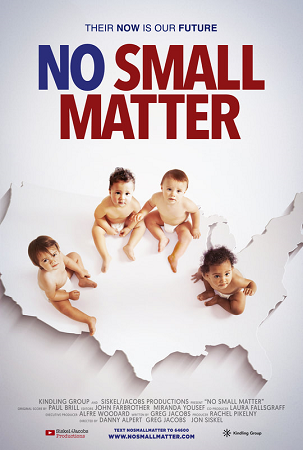
No Small Matter 2019
Distributed by Passion River Films, 154 Mt. Bethel Rd., Warren, NJ 07059; 732-321-0711
Produced by Alfre Woodard, Rachael Pikelny, and Laura Fallsgraff
Directed by Danny Alpert and Greg Jacobs
Streaming, 74 mins
College - General Adult
Early Childhood Education; Family Relations; Social Psychology
Date Entered: 10/12/2020
Reviewed by Kay Slattery, Research Services Librarian/Liaison to Education, Business, Kinesiology & Public Health, Louisiana State University-ShreveportNo Small Matter is a powerful story of the state our Early Childhood Education in the United States. The film asks the question, “When do we, as humans, begin to learn? This question is asked by a daycare teacher, Rachel Giannini to her class of four-year olds in the “Yellow Room” in the Highland Park Daycare. One child responds, “The day you were born.” This is a profound revelation to many people because we thought children were incapable of learning until they started school at age five. They did not communicate well until the age 18 months. We considered a child to be a “deficient” learner because they could not respond with words.
Parents usually returned to work upon the birth of their baby and handed the care and education of their children to others, relatives, babysitters or daycare programs and teachers. Thirty-five years ago, we began to change our viewpoint. The development of technology to examine the brain of a baby, called the “stethoscope for the brain,” has shown baby’s brain is developing rapidly during the first three years of life. Our society has been unaware of a child’s need for parental and family communication. The impact of adult’s interaction with children, especially the parents, is key to the development of a child. Their interactions is “food” to the health and well-being of a child and affects the child for the rest of their life.
The experiences of a child affect their brain development; therefore, the childhood years provide a “window of opportunity for parents, caregivers, and communities to provide experiences of learning that lead to a child’s achievement, success and happiness. No Small Matter tells the stories of parents, married and single, showing how difficult it is to rear their children at the most critical time in a child’s life, zero to three years old. This film shows the programs that are helping the children, such as the Abecedarian Project, started in Chapel Hill, North Carolina, a program for children from disadvantaged homes to experience a high-quality childcare and preschool. It used a curriculum of educational games that focused on language development and cognitive skills. One of the children, Shay Gattis started his early childhood education at age three, and today he is a successful counselor and coach as an adult. He gives credit to this early childhood program he attended as a child for his success. Another program that focused on the family as a whole, is the AVANCE used in the Waco, Texas area. The children of low-income families are able to attend high quality daycare programs. The AVANCE Programs provides parents with educational and work skills programs to enable them to find better jobs to provide for their families. Children and adults who graduate from these programs are more successful in their adult lives.
The Kindling Group collaborated with the Siskel/Jacobs Production to produce this entertaining and inspirational film. This group has produced over 10 hours of award-winning films for public television. The Siskel Jacobs Productions produced a film, entitled Louder Than the Bomb, and received a 100% approval rating from the rottentomatoes.com. They also won the 2011 Humanitas Prize for documentaries, and it was aired on the “OWN Documentary Club,” operating on the Oprah Winfrey Network.
This movie sends a message for parents, families, and society as a whole, we must acknowledge this phenomenon, and pave the way to nurture and teach our children when they are born.
This movie is highly recommended for University and Colleges of Education curriculum collections, state and local Boards of Education, and for large public library collections for the parents of young children to watch and learn about the critical issue of an early childhood education for their children.